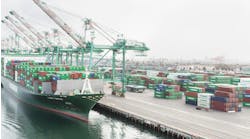The Securities and Exchange Commission issued its final rule on corporate conflict minerals reporting in August, and now companies throughout the electronics supply chain must determine how it affects them. The rule stems from a requirement in the Dodd-Frank Wall Street Reform and Consumer Protection Act dealing with the sourcing of certain minerals from the Democratic Republic of the Congo (DRC). The law requires publicly traded companies to disclose annually whether or not they have used tantalum, tin, tungsten, and gold mined from the DRC, where trade in such minerals fuels criminal networks and is perpetuating violence in the region. The law aims to stem violence in the area by curtailing trade and stopping the flow of money to violent regimes.
But the issue has been controversial from the start, and an extended comment period brought to light myriad concerns from companies throughout the channel. Globalpurchasing.com asked Ken Manchen, director of safety, health and environmental affairs for electronic components distributor Newark element14 to weigh in on the issue recently.
Globalpurchasing: Now that the SEC has released its final rule on corporate conflict minerals reporting, what does this mean for the electronics supply chain?
Ken Manchen: The conflict minerals rule requires publicly traded companies to annually disclose the source of any tin, tungsten, tantalum or gold (conflict minerals) added to and contained in their products. If any are present, companies must determine whether the materials were sourced from mines located in the Democratic Republic of Congo (DRC) or adjoining countries where armed rebels are exerting control and profiting. The goal is to stop the flow of funds to rebel groups committing human rights abuses in the region.
Members of their electronics supply chain will have to make extensive inquiries and report back to the Securities and Exchange Commission and their customers on the presence and origin of any conflict minerals present in the products they are selling. Although the rule only applies to publicly traded companies, the requirements are expected to affect the entire electronics supply chain.
Affected companies will each have to submit an end of calendar year “specialized disclosure” (SD) report to the SEC that declares whether conflict minerals are present in their products, and whether all were sourced from conflict-free mines and smelters.
Globalpurchasing: What is the implementation timeline?
Manchen: Affected companies will have to file SD reports with the SEC each year by May 31. The first one is to cover calendar year 2013 and will have to be filed by May 31, 2014.
Globalpurchasing: The rule was delayed because of an abundance of questions and comments about the issue—particularly the cost to companies that will have to implement reporting procedures. What, if any, accommodations have been put in place as a result of the extended comment period?
Manchen: The lengthy comment period was necessary because the rule was enacted in a non-conventional way. The lengthy comment period allowed necessary revisions to be made.
The conflict minerals requirement was enacted as an add-on amendment/section to the Dodd-Frank Wall Street Reform and Consumer Protection Act. The conventional way would have been to form a congressional committee, hold public hearings to get input from affected parties, and then create a stand-alone conflict minerals law for a congressional vote.
The SEC was required to issue a preliminary rule in an area for which it had little or no expertise, without adequate input from affected parties. The SEC had to issue their rule and then revise it after getting needed input from affected parties. It was difficult to estimate the cost to comply until after the preliminary rule was written.
The SEC amended their rule after receiving comments. Here are nine accommodations they made:
- The SEC clarified what products would be covered. The SEC decided to only cover products to which a conflict mineral is intentionally added and is necessary to the functionality of the product. They limited covered products to those necessary to meet the goals of the legislation.
- The SEC provided more guidance on what a company had to do in determining whether the materials they used were sourced from mines located in the Democratic Republic of Congo (DRC) or adjoining countries. This activity is known as “conducting a reasonable country of origin inquiry” (RCOI).
- The SEC allowed a two-year phase-in period during which companies conducting RCOI surveys would be allowed to report “indeterminate” in instances where data was not available.
- The SEC decided to require all companies to submit a conflict minerals (SD) report annually on May 31, instead of requiring the SD to be included in the company’s 10K report. This makes company reporting dates uniform and addresses liability concerns associated with including it in a company’s 10K report.
- The SEC decided not to require labels on products stating whether the product is “DRC Conflict Free” or “Not DRC Conflict Free.”
- The SEC decided the intent of the rule was to regulate mined materials and that it was not necessary for companies to conduct an RCOI on recycled and scrap materials used.
- The SEC decided to exclude conflict minerals already in the supply chain (as of January 31, 2013) from disclosure requirements.
- The SEC decided that sections of company reports where the findings are “indeterminate” do not require independent private sector auditing. They also broadened the definition of an auditor to increase the number of auditors allowed to perform audits.
- The SEC was able to prepare a more reliable estimate of the initial and annual costs of compliance. They also acknowledged that much of the cost will fall on non-reporting companies that are part of reporting companies’ supply chains.
Globalpurchasing: How does the final conflict minerals rule affect each party in the supply chain—manufacturers, distributors, end users?
Manchen: It affects everyone in the supply chain, even companies not subject to SEC reporting rules.
Publicly traded manufacturing companies and contract manufacturers will have to determine whether any tin, tungsten, tantalum or gold “necessary to the functionality of the product” is contained in their products. If yes, they are subject to the conflict minerals rule and must conduct an RCOI to determine if the materials present originated from the DRC region (or are from recycled or scrap materials). These companies must file an annual SD form with the SEC disclosing information on the source of conflict minerals contained in their products.
Publicly traded manufacturing companies and contract manufacturers will require their distributors and suppliers to report back to them on the presence and origin of conflict minerals in the components they supply. This requirement will apply to both private and foreign suppliers, even if not regulated by the SEC. A manufacturer will not be able to prepare a report without gathering reports from their suppliers.
The high cost of reporting will undoubtedly result in higher costs to consumers and end users.
Manchen: As a distributor, what is your view of the final rule and how it will affect both industry and society in general? What are the greatest benefits of the regulations?
Manchen: While nobody can criticize the intent of the rule, there is disagreement over how it will affect both industry and society. Two of the five SEC commission members voting on the final rule were so uneasy with the final rule that they voted against it.
The two dissenting members stated they weren’t convinced the rule would be effective in stopping the flow of funds to rebel groups committing human rights abuses in the region. They expressed fear the rule would encourage illegal smuggling of mined materials out of the region, and that conflict region materials would then be mixed with conflict-free materials. They also stated they weren’t convinced that targeting manufacturers was the right approach in addressing this issue.
DRC government officials have voiced concern that the rule could result in companies not buying mined materials from the DRC region. If that happens it would make conditions worse in the region for those locals trying to make a living by mining.
I don’t think anyone in the electronics supply chain is pleased with the legislation process that was followed, or the amount of after-the-fact work needed to create a practical and implementable rule. Compliance will undoubtedly be a burden on industry. Regardless, if the final rule proves effective in stemming human rights abuses in the DRC region it will have been worthwhile.
Globalpurchasing: Are there any other highlights you’d like to point to? Any ongoing concerns you have?
Manchen: I am pleased that the SEC worked with affected parties in crafting their final rule. I also want to acknowledge the work done by the trade group IPC - Association Connecting Electronics Industries and its member companies in providing invaluable comments and feedback to the SEC. The SEC took the extra time needed to craft what we all hope is a workable rule. IPC is already drafting detailed guidance materials to assist companies in complying. These extra efforts may well be the reason this rule proves successful.
Ken Manchen PE, CHMM, is corporate director safety, health & environmental affairs for electronics distributor Newark element14.









